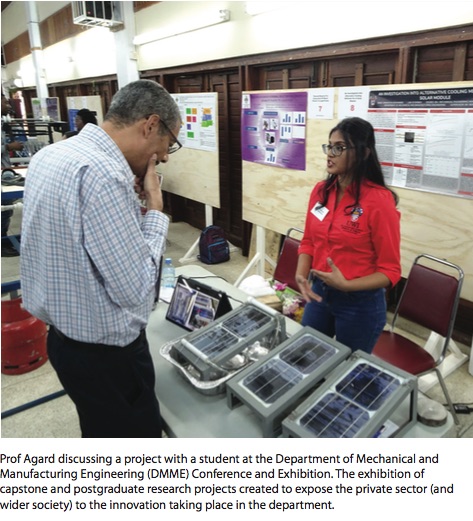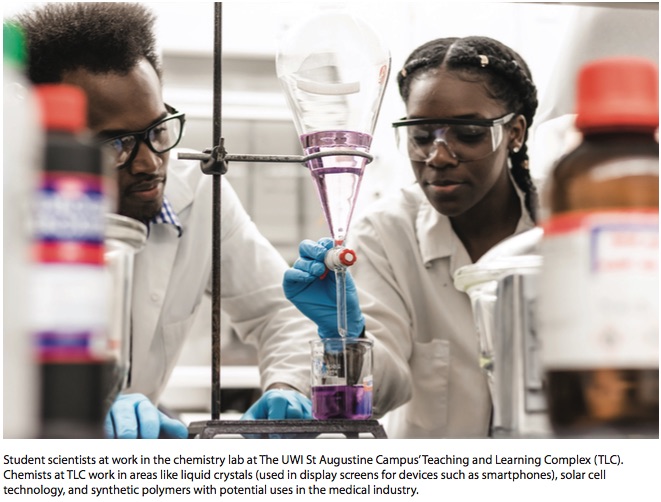UWI’s St Augustine Centre for Innovation and Entrepreneurship is a campus hub for ideas, investment and opportunity
The Caribbean and its diaspora has no shortage of ideas. We are a people with a wealth of creativity and curiosity— but turning these ideas into opportunities has not always been our strong suit. When The University of the West Indies unveiled their Triple A Strategy in 2017, resting on the pillars of Access, Alignment and Agility, the goal was to harness the collective knowledge and creativity of the university and foster academic and entrepreneurial empowerment for the Caribbean.
“In The UWI’s Triple A Strategy, the middle ‘A’ was alignment, and The UWI can’t be speaking to itself,” says Professor John Agard, Director of the St Augustine Centre for Innovation and Entrepreneurship (StACIE). “We have to talk to industry, private sector, and come up with collaborations with them. We need to find problems worth solving, essentially.”

StACIE, which started out as the Business Development Office and then became the Office of Research, Development and Knowledge Transfer before its current iteration, was created to propel The UWI’s evolution beyond traditional teaching, learning and research and into the realm of local and regional innovation and entrepreneurship. This collaborative approach will allow The UWI to get funding for research that can then be used practically within the relevant industries and, hopefully, to boost our economy as well as our sustainability.
One such project aims to use organic material to produce biogas (a renewable fuel produced by breaking down organic matter like food waste) as an alternative energy source that might lessen our dependency on oil and gas. The project is a collaborative effort with Switzerland-based multinational energy producing company PROMAN.
“Biogas is a clean fuel that can be used as a replacement for natural gas, and also can be used to generate electricity. The intended purpose of the waste to bioresource collaboration between The UWI and PROMAN is to propose a platform for the production and integration of a biogas supply chain from available waste resources within Trinidad and Tobago,” explains a statement from StACIE.
“For The UWI, commercial innovation and entrepreneurship— bringing in money— is the big direction,” says Prof Agard. As the university seeks to change with the changing times, it is necessary to both “ensure its own survival [and] assist Caribbean nations to move to higher levels of economic growth and development,” according to the Triple A Strategy booklet. StACIE’s role in this is to coordinate UWI St Augustine’s innovation and entrepreneurship ecosystem and be the first port of call for those seeking research and development, prototyping support, grant or seed funding, and IP management, development and protection support.

As the new generation of graduates is heading out into the workforce, many are realising that sending out CVs and looking for jobs is an increasingly frustrating endeavour. The pandemic has put an even greater strain on the economy, and job seekers are finding it difficult to get their careers started.
“A lot of people are out of work,” says Prof Agard. “So what we are working towards is for people to come up with ideas, form a company and employ other persons.” He compared it to Shark Tank, where entrepreneurs pitch ideas in the hopes of getting investments for their projects. Similarly, StACIE aims to connect the idea people with the right funding, and get meaningful projects that can change the Caribbean landscape.
Another by-product of not only the changes caused by the pandemic but also the rapidly altering state of normal created by global issues like climate change, is that we in the Caribbean need to find more self-sufficient ways of existing. As pandemic shortages in 2020 showed— the more we depend on importation of ideas and products from outside the Caribbean, the more vulnerable we are to changes across the world. By supporting and encouraging local and regional collaboration, we strengthen our capacity to deal with future crises, not to mention the current crises that have arisen over the last two years.
“The discussions with the Principal [of the St Augustine Campus Prof Brian Copeland] was that things have changed,” says Prof Agard. “We have to encourage innovation and entrepreneurship, to share knowledge; to bring in money.”
“The UWI has two funds. One is the Research Development Impact Fund, chaired by the Principal. People present their idea and then the best ideas are given money to start realising their projects. There’s another fund called the Innovation and Technology Transfer Fund that only funds projects that are close to commercialisation,” says Prof Agard. “The UWI is trying to push its community to come up with clever ideas, and see if you can turn them into commercial ideas. The intention is that when these ideas start to make money, you would then return some money to The UWI.”
This push to encourage staff and students to be innovative and enterprising is meant to identify and invest in leaders and empower them to improve the world. With a rich creative landscape like ours, we have an unending supply of unexplored ideas, and in moments of crisis like the one we are experiencing now, there is always the chance to not just get back to normal, but to make our new normal even brighter and better than it was before.